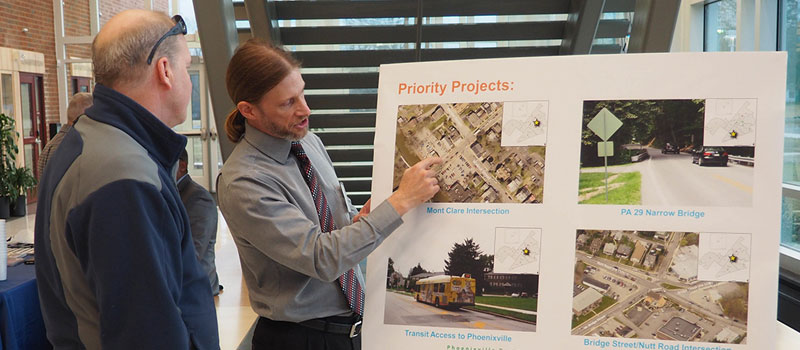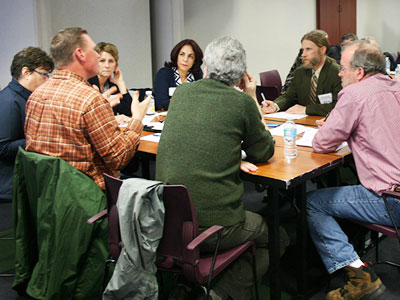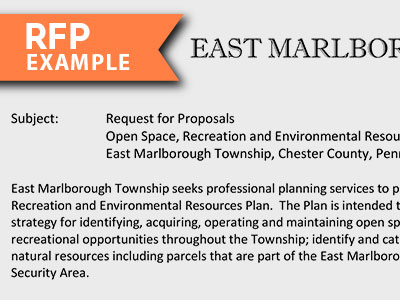Identifying consultants with the right experience and skills for the project is an important element of the selection process.
How it Works
Planning consultants bring experience, technical expertise, new ideas, objectivity, knowledge of current planning laws and practice, GIS mapping abilities, and public engagement techniques to projects. Both public and private planning efforts can benefit from professional planning services in many situations. Selecting the right consultant requires an understanding of a project scope of work and the skills required to carry out that scope. Consultant selection should be a clear, transparent process that compares needs, skills, costs, and other considerations. This tool reviews the techniques for identifying and selecting a consultant that best suits the project and meets the needs of the municipality.
Benefits
Specialized Skills
Planning consultants provide specialized skills and knowledge in specific areas the municipal staff may lack.
New Perspectives
Planning consultants can provide new perspectives and ideas for addressing challenging problems.
Objectivity and Experience
Planning consultants provide objectivity, experience, and professional credentials that can provide additional credibility to proposed actions.
Supplement Staff Resources
Planning consultants can perform tasks on a short-term or long-term basis to supplement existing staff resources.
An experienced consultant can provide a framework for taking a municipality through a complex planning process.
Get Started
- Define needs and expectations
Defining the project and setting clear expectations for how the project is to be managed by the planning consultant is a crucial step. - Identify prospective consultants
A municipality may use a Request for Qualifications (RFQ) as a method of identifying potential planning consultants who have the experience or skill necessary for the proposed project. The results of the RFQ can be used to narrow down the consultants who will receive the Request for Proposal (RFP) discussed in step 5. Municipalities can reach out to their neighboring municipalities or the County for information on planning consultants who have completed similar projects in the past. - Organize for selection
Municipalities should identify an internal consultant selection team, establish a decision making process, select the criteria for choosing a consulting firm, and prepare a recruitment/publicity plan. - Establish a budget and prepare a Request for Proposal (RFP)
An RFP should include a cover page, introduction, project overview, draft scope of services, proposed evaluation criteria, request for a consultant team organization chart, and resumes for key members of the consulting team. The approximate budget can be included to guide consultants. The RFP should be distributed in a transparent and open manner. (See "Examples" for sample RFPs) - Short-list, interview, and selection
From the proposals received, the municipality should select approximately two to three consultants to interview, based on the degree to which their proposals match the needs of the RFP. In addition to interviewing potential consulting firms, a municipality should check references and review samples of previous work completed. The potential consultants should be scored on an evaluation matrix, to help consistently evaluate each response. - Negotiate and execute a contract
The contract should include the cost, method of invoicing, scheduling, definition of work products, and a commitment of personnel. At this point, the scope of services should be reviewed along with the work schedule. The contract is final upon signature by all parties. (Note that a specific contract format is used by Chester County for VPP projects.) - Manage the project
A municipality must engage with the consultant and project throughout its duration to ensure the final product meets the project goal. A well written scope of work and contract will set the meeting and engagement requirements for a planning consultant to follow, and it is the municipality's responsibility to continually monitor the project to ensure that it meets their community's needs. - Confirm contract compliance and close project
As the project comes to a close, municipal officials must review and evaluate the consultant’s work to ensure the work complies with the contract. Project closeout includes final product delivery and payment of all invoices.
Consultants can help identify new ideas for addressing problems.
Considerations
Minimum Requirements
When selecting a planning consultant for a project, having minimum requirements based around education and related work/project experience are important criteria.
Grant-funded Projects
If the project is partially or fully grant funded, the municipality should carefully review any consultant selection or consultant qualification requirements of the funding program. Failing to follow such requirements may jeopardize the grant award.
VPP-funded Projects
The minimum required credentials for a Lead Planner under the Chester County Vision Partnership Program (VPP) include the following:
Bachelors or Master's Degree in Planning, Landscape Architecture, or related field, from an accredited college or university. Membership in the American Institute of Certified Planners (AICP) is preferred.
A minimum of five (5) years of professional planning experience, at least two (2) of which have been in Pennsylvania. This experience must include primary responsibility for major planning projects, experience in municipalities of similar size and character, and proficiency in the primary tasks of the proposed project.
Proven experience in
- Project management
- Working with municipal officials to establish public policies and programs
- Analyzing the consequences of recommended actions; and
- Applying elements of the planning process, including problem identification, goal setting, identifying alternatives, implementation, and evaluation.
Scope Creep
The municipality should be prepared to manage the issue of "scope creep" which occurs when the original scope of work expands after a project is underway. In some instances, a project task force may ask for additional work to be done outside of the agreed upon scope or the consultant may suggest additional tasks. Under either scenario, the project time frame and costs can begin to expand to the point where it is difficult to complete the work within its budget and deadlines.

Multi-Municipal
South Coatesville Borough, Valley Township & City of Coatesville: Economic Development Study







